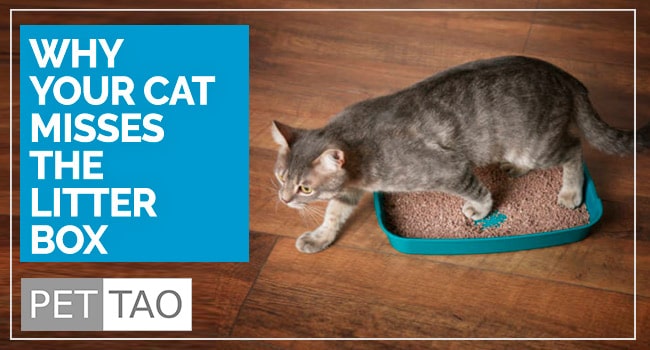Litter box misses and cat messes are disgusting!
When your cat misses the litter box, also known as feline inappropriate elimination, your life turns upside down.
More mess to clean up, more bad odors in your home.
Why does your cat miss the litter box?
Find the cause to address the problem. Most cats missing the litter box are experiencing illness or behavior issues. (insert a link to pet health cornerstone)
Why Might Your Cat Miss the Litter box?
There are many different reasons your cat might miss the litter box.
Reasons might vary and might be mental, physical, or emotional.
Next, we’ll look at some litterbox-missing scenarios.
Illness
Drs. Damron and Smith, PET | TAO’s co-founders and practicing veterinarians, recommend a urine test for any cat experiencing urination issues.
Diagnostic litter is another way to help detect health problems early. Diagnostic cat litter tells you when your cat is ill by measuring urine pH.
The urine sample tells the doctor if your cat is dehydrated, has kidney issues, inflammation, or common urinary problems like FLUTD, FUS, cystitis, or blockages.
Feline Lower Urinary Tract Disease (FLUTD)
FLUTD, Feline Lower Urinary Tract Disease, is a broad term describing a number of conditions associated with the feline lower urinary tract.
FLUTD represents problems including inflammation of the bladder or urethra, formation of urinary stones in the bladder, and partial or total obstruction of the urethra.
Although FLUTD affects only 0.5% to 1% of the population, male cats are more susceptible to blockages due to their longer, narrower urethrae.
Some cats are more susceptible to urinary problems than others.
Behavior
Although behavior problems present as urine marking, the underlying cause is sometimes hormonal.
Although male and female cats spray, neutered or intact, neutered cats spray less.
Thus, neutering sometimes eliminates or reduces spraying.
Marking Territory
Most cats marking territory use the litter box normally in addition to marking behaviors.
Marking in the form of spraying typically happens on vertical surfaces. Some cats spray on horizontal surfaces, making it more difficult to identify the behavior – marking vs. house soiling.
Where your cat marks are of importance:
- Near furniture or doors signifies possible problems with other cats in the home.
- Under windows signifies possible threats from animals outside – usually other cats.
- Personal belongings signify possible anxiety about the owner of the items.
Separate multiple cats to determine the culprit if you live in a multi-cat household.
Stress
Stressors for cats include:
- Changes in household routine
- Addition or loss of humans in the home
- Aggression between cats
- Presence of new cats in the home or yard
- Illness of another cat in the home.
If health problems are the cause of your cat’s urinary problems, you can successfully manage the urinary or renal disease with the help of your veterinarian.
Are you open to learning new ways to help your cat feel better?








